Stay ahead of the curve as a political insider with deep policy analysis, daily briefings and policy-shaping tools.
Request a DemoHouse Clerk Bill Reilly: The man with the silver tongue
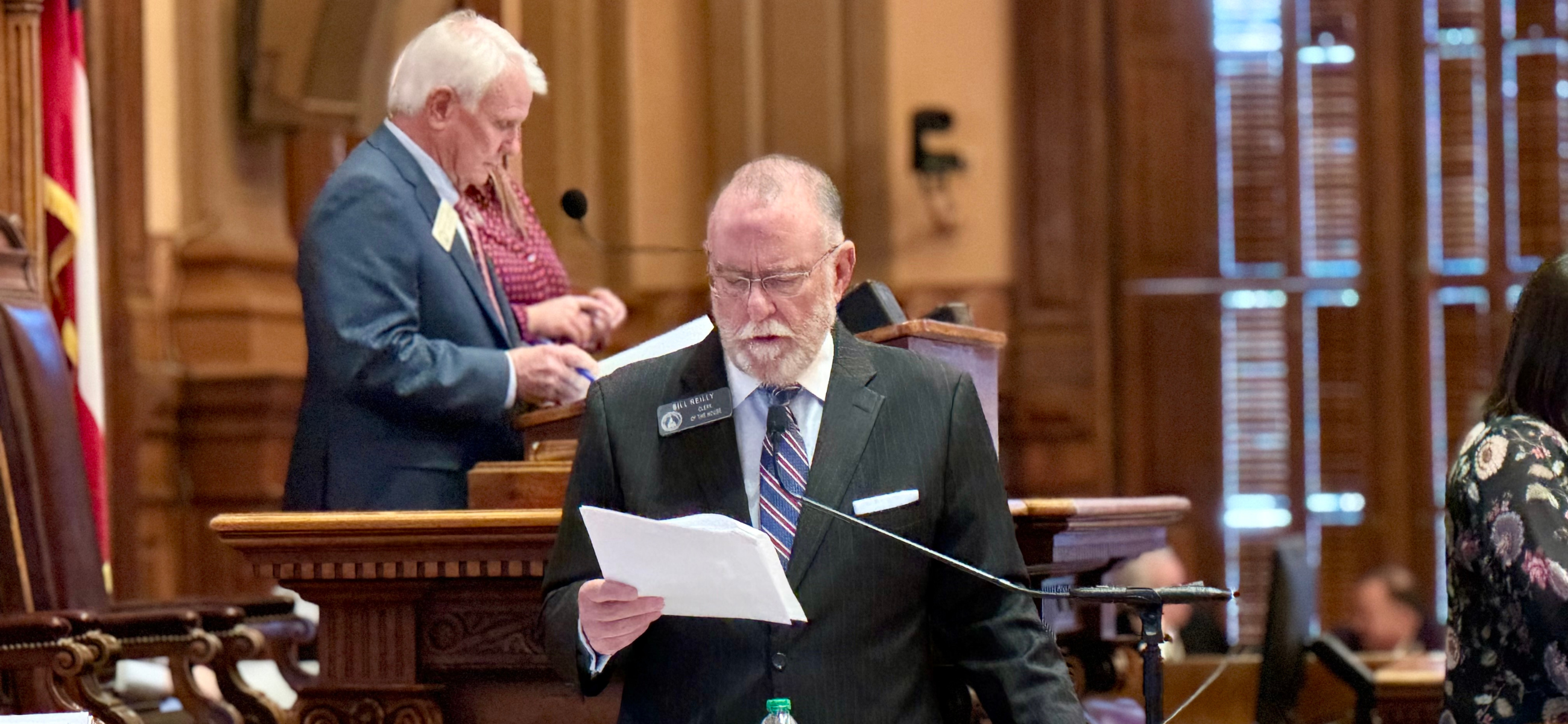
House Clerk Bill Reilly introduces bills on the House floor on January 10, 2024. (Credit: Jill Jordan Sieder)
Hailed for his silver tongue, Bill Reilly was elected to his first two-year term as the Georgia General Assembly’s House clerk in 2013 after serving three years as general legal counsel to the late Republican House Speaker David Ralston.
A criminal defense lawyer and juvenile court judge in the Appalachian Judicial Circuit, part of the 9th Judicial District, prior to working at the Statehouse, Reilly, a longtime resident of the north Georgia mountain country near Blue Ridge, is perhaps best known these days for his deep, velvety voice and calm demeanor as he introduces bills at a rapid clip at the podium next to the desk of Speaker of the House Jon Burns.
State Affairs isn’t the first to wonder if Reilly had a previous stint as an opera singer or auctioneer. We sat down with him recently to get the back story. This interview has been edited for clarity and brevity.
Q. So, are you in a choir, do you do voice-overs, have you been an auctioneer?
A. Not anymore, but I used to be in a choir a long time ago. I sang mostly bass, sometimes baritone. I have done some studying for commercial stuff; I thought I might read audiobooks … but I never really got back to it. You gotta be awfully good for that — keep the same tone for 369 pages. I’ve not been an auctioneer, but I’ve had lots of people ask me that because you have to read the bills so fast. I don’t think I can talk as fast as those guys.
Q. Tell me about your background and career. What led you to this position as the House clerk?
A. I was born and raised in Bridgeport, Connecticut. My dad worked at Yale-New Haven Hospital, where he was a budget director there back in the ‘70s. And we lived in Trumbull, which is a little suburb outside of Bridgeport, until 1971. I attended Southern College, the University of Tennessee at Chattanooga, Troy State University and West Florida University. I started as a biology major, pre-med. Organic chemistry sunk me [and] my GPA. …The [U.S.] Air Force [where he served from 1974 to 1977] helped me to get my priorities straight. I finished my undergrad in law and went to law school at Western State University out in Orange County, California. I graduated, and started working for a law firm in Chattanooga. And so [after passing the bar exam] … I decided to go down to Ellijay, which is like 14 miles down the road in Gilmer County, and I opened up a law practice there.
Q. What kind of law practice?
A. In small town practice, you better do everything. And this is before the [Georgia] Public Defender Council had public defenders everywhere. So if you practiced in the mountains, the judges required you to take indigent criminal defense cases. … So that’s basically where I learned how to try cases and present myself in court. But the criminal practice kind of took over. Because you got to spend so much time in court and I was doing it in three different counties — in Jasper in Pickens County, Gilmer County in Ellijay and up in Blue Ridge. And along the way, I met David Ralston. We met searching titles in the Fannin County records room. We became good friends. He actually was a groomsman in my wedding.
So I practiced in Ellijay, did a lot of the criminal defense work in the three counties, picked up some probate and divorce work. And then [in 1990] Judge Bobby C. Milam, our circuit judge, approached me about serving as a juvenile judge. I kind of halfway think he did that so I wouldn’t be such a thorn in his side on criminal cases, because we were always trying to get them to throw things out or lessen the offense or mitigate damages for the poor guy that you’re representing. So I became the juvenile judge up there, and basically walked away from my practice.
Q. So becoming a juvenile court judge happened pretty quickly. What appealed to you about that?
A. We needed a judge up there who would address the issues that we had in that mountain community. Initially, when I came up there, a juvenile calendar would be someone joy riding in mom’s car or somebody fishing in somebody’s trout pond. I mean, it wasn’t big. And then all of a sudden, juvenile court just exploded and kids were being charged with the same things that adults were being charged with. … We had a bad meth problem. We were dealing with, you know, parents, who couldn’t take care of their children, and deprivation. There weren’t a lot of job opportunities. All the mills were starting to close. Levi Strauss was up there. Almost every woman that I knew that was over the age of 50 had worked at Levi Strauss, the plants up there, and then all that shut down. And there was nothing really to replace any of it. And then the [copper] mines closed over in Copper Hill [Tennessee] where most of the men worked. So it was just kind of a down time. And who knows why drugs take off in a community, but they did in ours. And I think it’s still kind of a problem in the mountains.
Q. How many years did you practice as a judge?
A. Almost eight. … And then Sonny Perdue became the governor, and I applied to be the commissioner of DJJ [Department of Juvenile Justice]. It came down to two of us. And Sonny Perdue picked the other guy. And then the other guy [Albert Murray] made me his chief of staff. So that’s how that worked. At that time, David Ralston was Sen. Ralston, and then he came back over to the House. He was the Judiciary Chairman. After I left DJJ, I was the lawyer for the Judiciary Committee for a couple of years. And then [Ralston] decided he was going to take on Mr. [ House Speaker Glenn] Richardson, the first time, which didn’t bode well for him. And he got banished and was no longer chairman and I was no longer the attorney for the chairman. So I did some private practice again. And I was actually out in Colorado with my wife and son when David called me and said, ‘I think I’m gonna win the speaker’s election. I’d like you to be my lawyer. Can you be here the day after tomorrow?’ Well, I’m in the mountains. He didn’t ask which mountains. I was in Colorado, on a ski vacation. And we just got in the car and drove straight back. We were here for the event.
Q. What made you so loyal to Ralston?
A. Well, we were good friends for a long time. I mean, he would come to my house, I would go to his house. We spent New Year’s together. We celebrated births. His dad was the clerk of the court down in Gilmer County. And he was a tremendous help to me.
Q. And generally, what does the counsel to the speaker do?
A. Well, when he’s a brand new counsel to the speaker, he’s wondering if he’s doing what he’s supposed to be doing. It was kind of a difficult job to learn. Because really, I didn’t know what I was doing. I mean, none of us did. He [Ralston] was a new speaker. Everybody was brand new. We stepped on each other’s toes quite a bit. I spent a lot of time reading. I mean every bill that got dropped and assigned to committee, I read all of it. And so it had a lot to do with keeping him apprised of what was being filed, talking to his chairmen about what the speaker wanted to see and what direction things should go. It was talking to lobbyists about what were their priorities in their particular pieces of legislation. And so it was very busy all the time. I would help determine if bills were legally sound, or constitutional. Or, you know, is this a good idea for us? Is this a good idea now?
Q. And what aspects of the clerk job appealed to you?
A. You could be nice to everybody. It wasn’t partisan. You know, you try to help everybody with whatever problem they have, procedurally. But it was just a step in a different direction from being in the speaker’s office and in that kind of political environment.
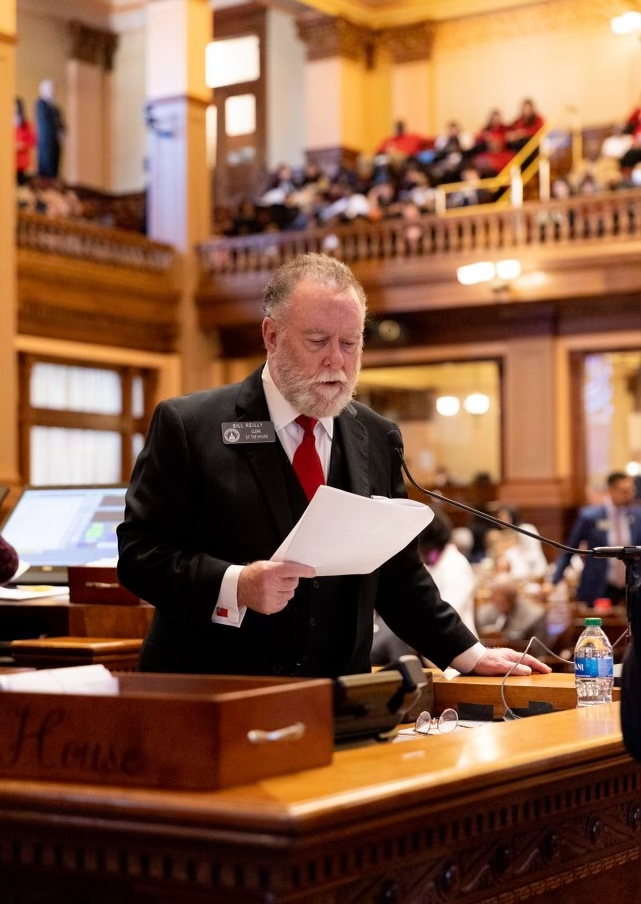
Q. Your most visible job duty as clerk is to read bills on the House floor, three times. You often read them fairly quickly. Some say that is an antiquated practice. What’s most important to you about that aspect of your job?
A. I would use traditional instead of the word antiquated. And it has been tradition. I try to do it better than my predecessor in that I try to enunciate so everybody at least knows what the bill is and who dropped it and whatever committee it’s going to. … So those are functions that have to happen. And they’ve probably been on the books and happening since the 1800s. We try to dress it up and make it a little quicker. I like the tradition. Nobody’s asked me to change it. Members have complimented me on being able to know what the bills are and where they’re going. I like that.
Q. Is part of your role helping new members understand how the legislative process works?
A. Yes. We typically after each election have several orientations for the members. But I talk to them about the legislative process, and I preface all my comments to them that the clerk’s office door is always open, you probably will have some questions you don’t want to ask in front of everybody else, I understand that, just come see me.
Q. What are the kinds of things that trip newbies up?
A. Finally getting one of their bills passed, and being so excited about it, that they move to have the bill immediately transmitted to the governor, which you can’t do unless the Senate says you can and unless the House says you can. So we’ve got to kind of say, ‘You know, we can’t do that right now.’ But those are the mistakes they make once and never make again.
Q. Do you take any pride when a new member either introduces their first bill or, or gets it passed?
A. New members typically want to have their picture taken with me when they’re handing me their new bill. The House, as a matter of tradition, will give a new member — everyone will know that it’s their first bill — an exceedingly difficult time in the well while they’re there. They’ll ask different kinds of questions, embarrassing questions, irrelevant questions. And then when the time comes, everybody votes no. Until the speaker is about to lock the machines and then everybody changes, and then he or she gets a standing ovation. So it is a big deal for the first bill. … I just shake his hand or her hand.
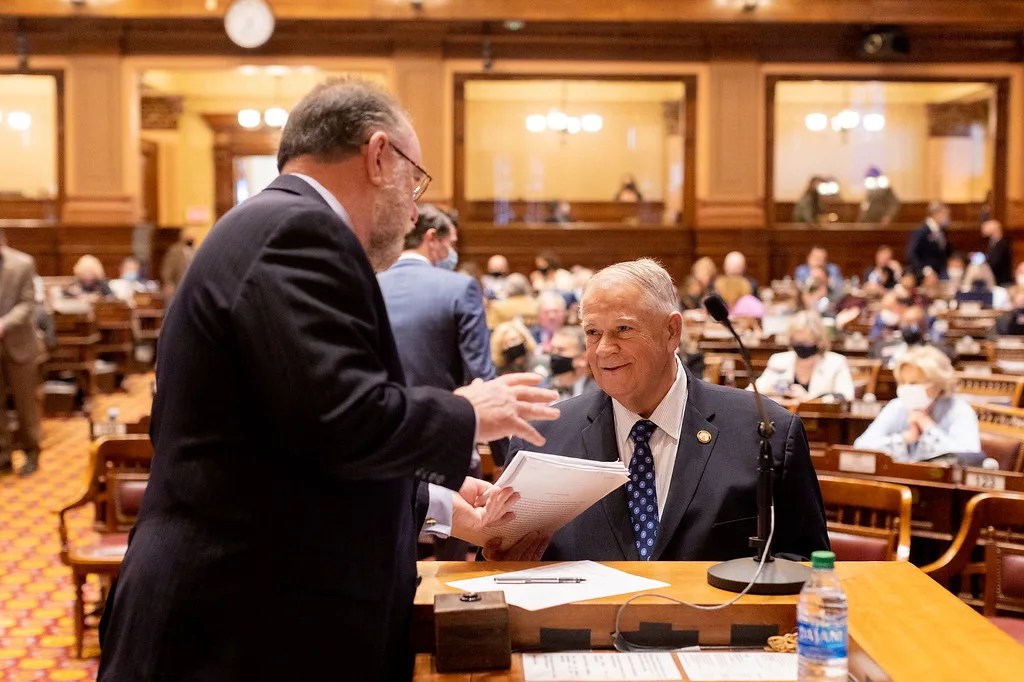
Q. There’s a photo of you I’ve seen from 2022 with Speaker Ralston handing you HB 1013, [the landmark Mental Health Parity Act], with a big smile on his face. What was that moment like for you?
A. Well, I knew it was coming. But that was a big day for the state. Still is. I really miss that guy. But that was a special moment. … When he files a bill, and then he gets a [Rep.] Mary Margaret Oliver to sign on, right underneath the Speaker of the House, I know that it’s going to be a bipartisan bill, and this is going to happen, alright.
Q. You’re the chief administrator of the chamber. You’ve got a big House body with 180 members. You’re the custodian of official records. You track bills and the attendance of House members. What else are you responsible for?
A. Well, I’m lucky I’ve got an assistant clerk, her name’s Christel Raasch, and she hates it when I say this, but she’s been working for the clerk’s office since Sherman burned the city. The truth is, she’s been here since the Reagan administration, and she’s a tremendous help. I think she’s got more institutional knowledge than anybody else in this building, really. But yeah, she keeps it moving.
… During session we hire temporary interns and folks to work as runners between here and the floor. And to answer questions of lobbyists, and just folks from the public that come in.
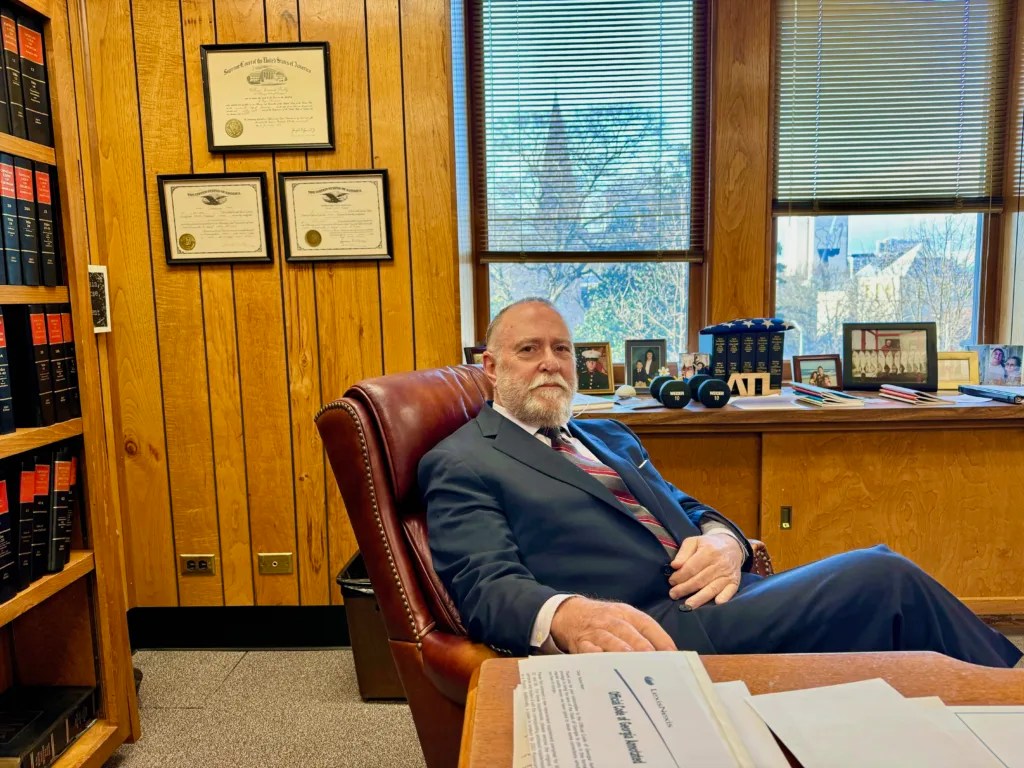
Q. And are you the one actually controlling the voting machines?
A. You mean when the speaker says ‘and the clerk will unlock the machines?’ See, I’m letting my secrets out here. No, we don’t unlock the machines, we haven’t unlocked machines for a long time. All that means is that [Carrie Vick, who is responsible for tallying all the votes] enables the desktops to be able to vote. And then when he says ‘the clerk will lock the machines,’” she disables that ability. So that’s what lock the machine and unlock the machine means. We’re just using terminology that dates from the ‘20s. So we’re not really locking or unlocking anything.
Q. I interviewed the speaker recently, and he mentioned that he was happy to see a return to decorum in the House. Have there been times when there’s been more passion, less decorum?
A. I think that the return to decorum really began with Speaker Ralston. I’ve heard some stories about what would go on on the floor. But he wouldn’t put up with that. And I think Speaker Burns is doing the same thing. Just you know, the whole world is watching, or at least the state is. Right? We are on TV. I mean, we can’t be clowns here. So I think it makes it a lot easier if everyone knows what’s expected of them, what they can do, what they can’t get away with.
Q. What would you say is the most challenging part of your job?
A. The most challenging part of this job was the session after COVID. I had to call out 180 names [over audio piped into various rooms] because we couldn’t have everybody together in the chamber because of the [need for distancing of] six feet, and some members were really concerned about their health. So there was no voting machine. We would just read the list of members over the microphone and they would answer back, yay or nay, and we would mark that, manually. Sometimes we had to do it twice. For every vote. I was hoarse for six weeks after that. So that was a challenging session.
Q. Thinking about your 10-plus year tenure now, what are your favorite parts of the job, or sort of high points for you?
A. Every Sine Die is a high point. When we get through and there haven’t been big issues or there haven’t been personnel issues. There haven’t been any conflicts with members. That’s a good day. … On Sine Die, there’s a lot of anxiety everywhere. Is the bill gonna make it? Are we gonna get across the hall? Is my bill back from the Senate? They’ll make me crazy with that. It’s a normal day that’s just really amped up because of the time limitations and the sheer volume of it. … I’m just happy to see the paper go in the air and hear the speaker say ‘Sine Die!’
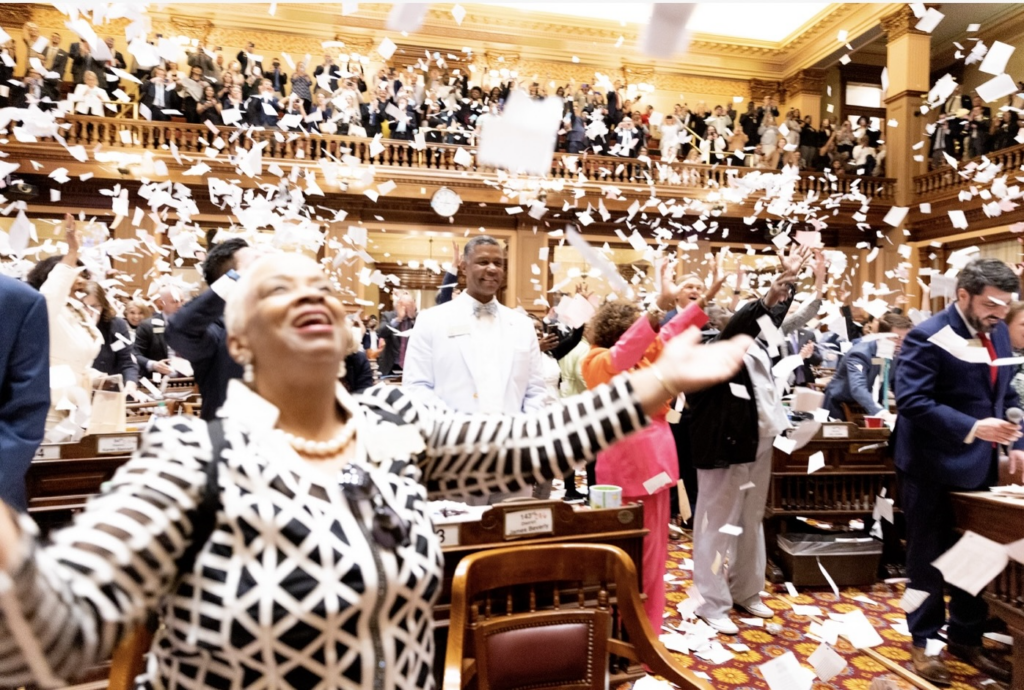
Q. You’re sort of like a witness to history in many ways in your job, all kinds of things happen in that chamber. Can you think of any sort of special moments where you were just glad to be there to see something?
A. I’ve had some incredibly sad days. It’s been a few years back, but when [Judiciary Committee] Chairman Wendell Willard retired, and [Education Committee] Chairman Brooks Coleman retired, real stalwarts of the House, they’d been around forever, and they made their little goodbye speeches, I must admit that I got a bit misty. When you work with people like that for 10 years like that. … I had to read the resolution, the tribute to Speaker Ralston, the session after he passed. I had to keep my composure when I did that. And that was hard. It’s still kind of hard talking to you about it, really. Thankfully, they had given it to me a day or two in advance, so I was able to talk myself through it. But it was hard.
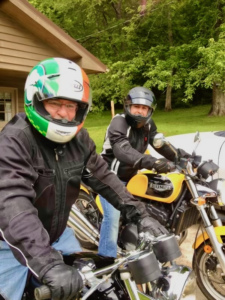
Q. If you weren’t serving as the House clerk, what else would you be doing?
A. I would teach little children how to ski out in Colorado and Montana. I skied before Christmas and that just seems like it would be such a fun job. I mean, if you’ve ever skied and see a ski instructor with five little kids like ducks coming down, slow. I mean, how can you not like that?
Q. Is there anything I haven’t asked you about being the House Clerk that you would like to mention?
A. Just that I love all my members, and I love some of them more than others.
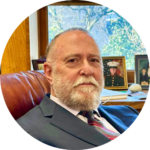
the bill reilly file
Position: Clerk, Georgia House of Representatives
Age: 68
Birthplace: Bridgeport, Connecticut
Current residence: Blue Ridge
Education: Bachelor of Science in law and Juris Doctor from Western State University in California.
Career path: Was both pre-med and pre-law as an undergrad, punctuated by a three-year stint in the Air Force. Settled on law and began his career as a general practitioner in Blue Ridge, where he gravitated to criminal defense law. Served as a juvenile court judge in the Appalachian Judicial Circuit, and then as chief of staff for the Department of Juvenile Justice. In 2010 he served as general legal counsel to Speaker David Ralston, and then took on the role of House Clerk in 2013.
Family: Wife Franny, who is now retired from the labor department, and son Michael, 31, who works as a health care lobbyist and is frequently at the state Capitol.
Hobbies/passions outside work: Snow skiing in Colorado and Montana, hiking and motorcycle riding in the north Georgia mountains. An avid Boston Red Sox fan.
Have questions, comments or tips? Contact Jill Jordan Sieder on X @journalistajill or at [email protected].
And subscribe to State Affairs so you do not miss an update.
X @STATEAFFAIRSGA
Facebook @STATEAFFAIRSGA
Instagram @STATEAFFAIRSGA
LinkedIn @STATEAFFAIRS
Professionals still face licensing delays amid state’s transition to online system
The Gist Georgia’s professionals and business owners are still struggling to obtain professional licenses in a timely manner. As the Secretary of State’s Office rolls out its new Georgia Online Application Licensing System to expedite the process, the efficiency of this new process is being put to the test. What’s Happening Thursday morning at the …
Controversy over AP African American Studies class grows
Rashad Brown has been teaching Advanced Placement African American Studies at Atlanta’s Maynard Jackson High School for three years. He’ll continue to do so — even though the state’s top education official removed it from the list of state-funded course offerings for the upcoming school year. While Brown prepares to start teaching his class on …
Students, teachers, lawmakers blast decision to end AP African American history classes
ATLANTA — A coalition of lawmakers, civil rights leaders, clergy, educators and students Wednesday called on the state’s education czar to rescind his decision to drop an advanced placement African American studies class from the state’s curriculum for the upcoming school year. “This decision is the latest attack in a long-running GOP assault on Georgia’s …
Kamala Harris’ presidential bid reinvigorates Georgia Democrats
Georgia Democrats have gained new momentum heading into the November election, propelled by President Joe Biden’s decision to bow out of his reelection bid and hand the reins to Vice President Kamala Harris. The historic decision, announced Sunday, is expected to prove pivotal in the national and state political arenas and breathe new life and …





